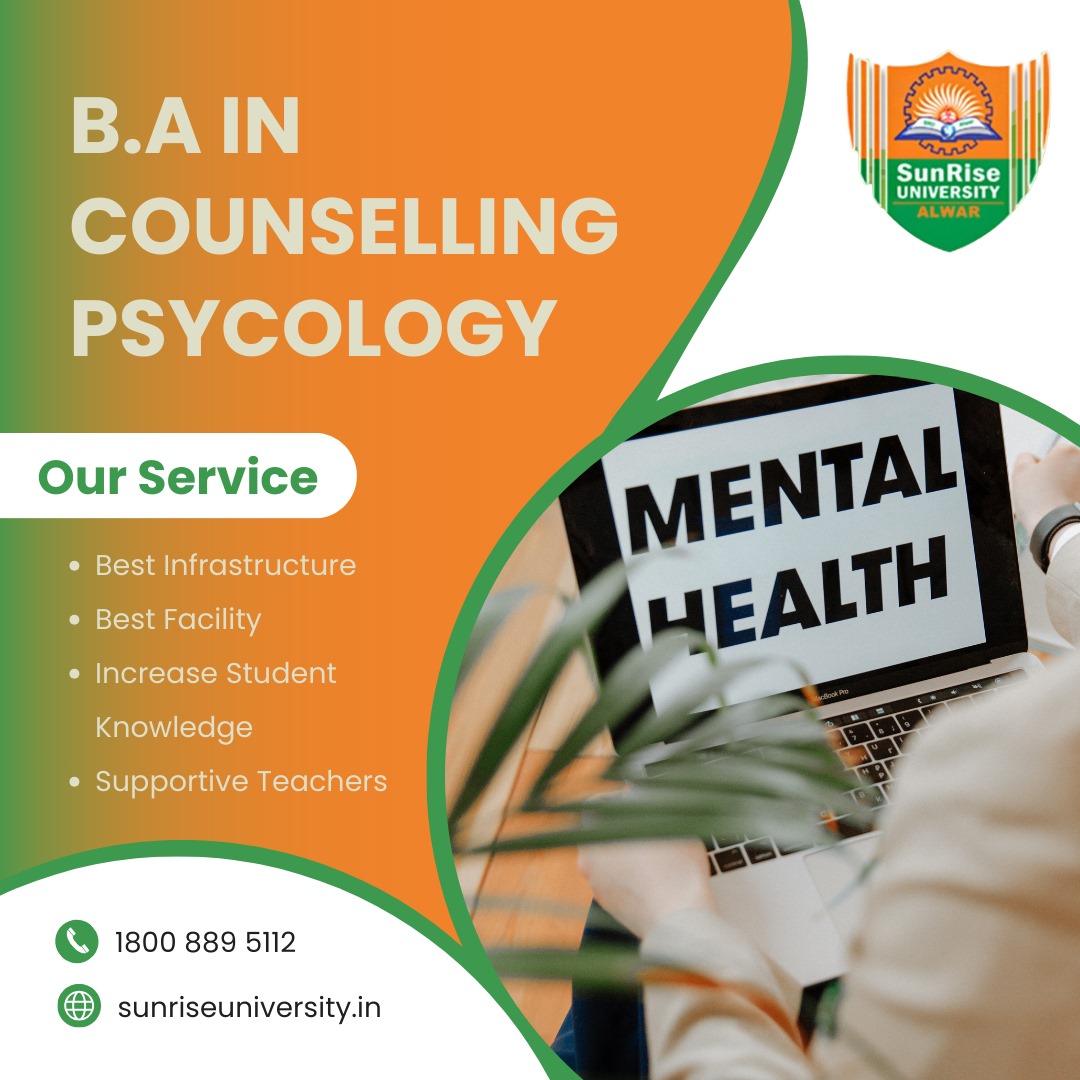Introduction about (B.A.) in Counselling Psychology
Sunrise University: (B.A.) in Counselling Psychology
Introduction, Admission, Eligibility, Duration
A Bachelor of Arts (B.A.) in Counselling Psychology is an undergraduate degree program designed by the best University of India that focuses on the study of human behaviour, mental processes, and emotional well-being. It combines elements of psychology, counselling theory, and practical skills to prepare students for careers in counselling, therapy, social work, and related fields.
How can I apply for admission to the (B.A.) in Counselling Psychology?
-
Research Programs: Start by researching universities or colleges that offer B.A. programs in Counselling Psychology. Look for institutions that are reputable and offer a curriculum that aligns with your interests and career goals.
-
Check Eligibility Requirements: Review the eligibility criteria for each program you are interested in. Common requirements may include a high school diploma or equivalent, specific grades in relevant subjects (such as psychology or social sciences), standardized test scores (like SAT or ACT), and possibly letters of recommendation.
-
Prepare Application Materials:
-
Application Form: Fill out the application form for each university or college you wish to apply to.
-
Transcripts: Submit official transcripts from your high school or any previous college-level coursework.
-
Standardized Test Scores: If required, send your SAT or ACT scores to the institutions.
-
Letters of Recommendation: Obtain letters of recommendation from teachers, counsellors, or professionals who can speak to your academic abilities and character.
-
Personal Statement or Essay: Write a compelling personal statement or essay that explains your interest in Counselling Psychology, your relevant experiences, and your career goals.
-
Application Fee: Pay the application fee for each institution, if applicable.
-
Submit Application: Complete and submit your application materials before the specified deadline. Make sure to double-check all documents for accuracy and completeness.
-
Interview (if required): Some programs may require an interview as part of the admissions process. Prepare for the interview by researching common interview questions and practicing your responses.
-
Wait for Admission Decision: After submitting your application, wait for the admissions committee to review your materials. They will notify you of their decision, usually via email or postal mail.
-
Acceptance and Enrolment: If you receive acceptance offers from multiple institutions, compare them carefully before making a decision. Once you choose a program, follow the instructions provided by the university for enrolment, which may include paying a deposit and registering for classes.
What is the eligibility for the (B.A.) in Counselling Psychology?
-
Educational Qualifications: Typically, candidates are required to have completed their high school education or an equivalent qualification (such as a GED). Some institutions may also have specific subject requirements or minimum grades in certain subjects.
-
Minimum GPA: Many colleges and universities require a minimum Grade Point Average (GPA) for admission into their B.A. in Counselling Psychology program. This GPA threshold can vary between institutions.
-
Entrance Exams: Some universities may require candidates to take entrance exams such as the SAT or ACT. These exams may be used as part of the admission criteria along with academic records.
-
Personal Statement or Essay: Applicants may need to submit a personal statement or essay explaining their interest in counselling psychology, career goals, and relevant experiences.
-
Letters of Recommendation: Some institutions may require letters of recommendation from teachers, counsellors, or employers to assess the candidate's academic and personal qualities.
-
Interview: In some cases, applicants may be required to participate in an interview as part of the admission process. This interview may assess their suitability for the program and their understanding of counselling psychology.
How long does it take to complete the (B.A.) in Counselling Psychology?
A Bachelor of Arts (B.A.) in Counselling Psychology program at the best University of India typically takes about four years to complete, assuming full-time study. This duration may vary depending on factors such as the specific program's structure, any transfer credits you might have, and whether you choose to study part-time or take accelerated courses.
Internship opportunities after the (B.A.) in Counselling Psychology?
Internship opportunities after completing a Bachelor of Arts (B.A.) in Counselling Psychology degree at the top University of India can vary depending on the specific field or setting you are interested in. Here are some common internship opportunities for counselling psychology graduates:
-
Clinical Internships: These internships are typically offered in hospitals, clinics, or mental health centres. They provide hands-on experience in providing counselling services to individuals with various mental health issues.
-
School Counselling Internships: If you're interested in working as a school counsellor, internships in schools or educational institutions can provide valuable experience in working with students, teachers, and parents.
-
Community Counselling Internships: These internships focus on providing counselling services in community-based settings such as non-profit organizations, community centres, or outreach programs.
-
Substance Abuse Counselling Internships: For those interested in specializing in substance abuse counselling, internships in rehabilitation centres or addiction treatment facilities offer practical experience in this area.
-
Family Counselling Internships: Internships in family counselling settings allow you to work with families facing various challenges and issues, such as relationship problems, parenting issues, or family conflicts.
-
Mental Health Counselling Internships: These internships focus on providing counselling services to individuals with mental health disorders such as anxiety, depression, PTSD, etc. They may be available in mental health clinics, counselling centres, or private practices.
-
Research Internships: If you're interested in research, internships in research institutions or with faculty members conducting research in counselling psychology can provide valuable research experience.






